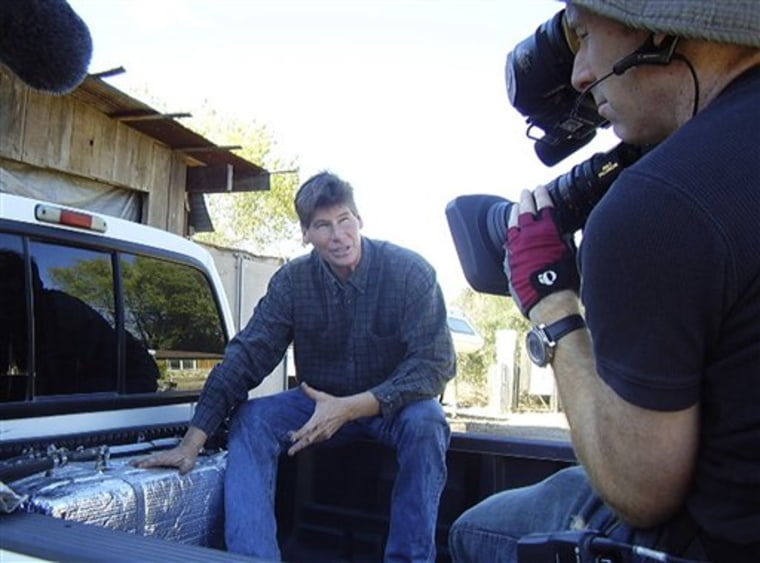Well, whaddaya know? The Earth's a star!
After languishing in the background far too long, Earth has landed on the covers of Time, Newsweek and Vanity Fair this month alone. It can also boast a starring role in an Oscar-winning movie (Al Gore's documentary, "An Inconvenient Truth").
Meanwhile, TV is jumping on the "eco" bandwagon, including the recent announcement of Discovery PlanetGreen, a network dedicated to living a green lifestyle. It begins next year.
Much sooner, Sundance Channel is (in its own words) displaying its commitment to ecological issues and environmentally sustainable approaches to modern living. "The Green" is its umbrella title for a weekly programming block that aims to do Earth justice at a moment of particular urgency. The Green starts Tuesday at 9 p.m. ET (only days before April 22 — Earth Day, of course).
"Other than the original launch of the network (in 1996), this represents the largest investment we've ever made in an initiative," says Sundance Channel CEO Larry Aidem. "It's going to be a regular prime-time destination, every Tuesday night, indefinitely."
The Green is the network's latest venture beyond its independent-film roots.
"We're not just for film fanatics anymore," says Aidem, adding that The Green reflects the passion for environmental issues long exhibited by Sundance Channel founder Robert Redford (who is partnered in the network with NBC Universal and CBS).
'Big Ideas' segments
The Green will address such problems as global warming, pollution and energy depletion. But emerging solutions will be highlighted, too.
"It won't be all gloom-and-doom," Aidem promises.
In its first 13 weeks, the night will begin with "Big Ideas for a Small Planet," which zeros in on green strategies for modern-day challenges. Topics include "Build," "Furnish," "Work" and "Kids." Then each "Big Ideas" edition is followed by a thematically complementary documentary premiering at 9:30 p.m.
Also part of the package are interstitial elements (including "Eco-Biz" and "The Ecoists") and a pair of hosts: journalist Simran Sethi and community advocate Majora Carter. And to help steer the whole endeavor, Sundance Channel has mobilized an advisory committee of some 30 environmental organizations and experts.
On Tuesday, "Big Ideas" begins with "Fuel," which poses the question: Can we imagine a world without gasoline?
Joel Woolf is trying to. The CEO of Veg Powered Systems, he will convert your diesel vehicle to a dual-tank rig that runs on diesel fuel ... or on vegetable oil. Take your pick.
Watch him at a racetrack frying chicken, then reusing the oil to fuel his truck for a "grudge match" with a gasoline-powered car. (He loses the race, but makes his point: His truck runs fine, while emitting a not-unpleasant scent of fried chicken.)
Woolf's isn't the only big idea offered. But, clearly, every good idea for alternative energy is needed: According to the show, for every mile you drive in your gas-powered car you release about one pound of global-warming pollution.
"All the things that you take for granted are at risk right now," warns global-warming activist (and wife of Larry) Laurie David. "The fall leaves changing at the time they're supposed to change. And snow falling when it's supposed to fall. And plants blooming when they're supposed to bloom.
"There's gonna come a point in time when our kids are gonna say, `What the heck were you thinking? Did you know and do nothing?'"
Crash course on oil
Following this half-hour, a documentary enlarges on the don't-be-fuelish theme.
"A Crude Awakening: The Oil Crash" is a crash course in the past, present and diminishing future of oil.
The film visits McCamey, Texas, which once was an oil-rich boom town but now, despite blithe assumptions that the good times would never end, appears to be bust.
"Now we realize you're going to deplete your supply, sooner or later," says Mayor Sherry Phillips. "They're not making a lot of dinosaurs anymore."
Even so, the modern world remains beholden to oil in what one speaker calls a "state of oil worship." And inasmuch as U.S. oil production peaked in 1970, "more and more, oil is going to come from less and less stable places," says Terry Lynn Karl, a Stanford University professor of political science.
This can only heighten a problem oil has foisted on consumers for decades, she adds: "Oil fuels war. It's a catalyst for war. It's something that prolongs war. It intensifies war."
In week two, "The Green" presents "Waste Food," a documentary that envisions a world whose every product, once discarded, is made reusable as something else. And the accompanying "Big Ideas" has some helpful suggestions on how to build green. Good thing for earthlings.
"The planet's fine," one speaker insists. "But WE'RE at stake."
Background on the show is online at www.sundancechannel.com/thegreen.
